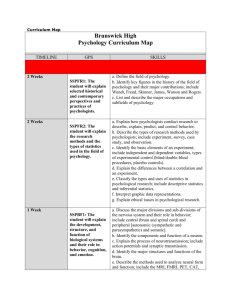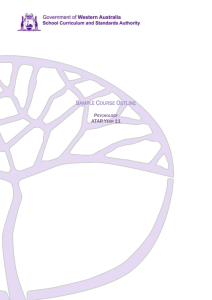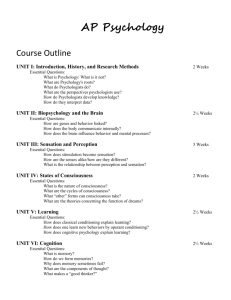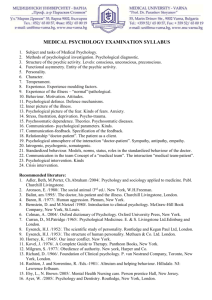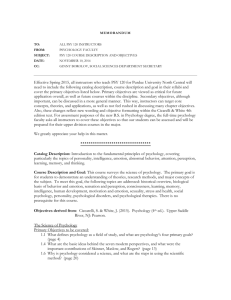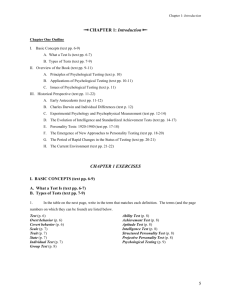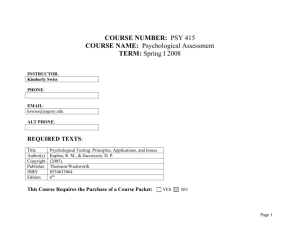PSYCHOMETRICS PSY410 COURSE OUTLINE Course Aim The
advertisement
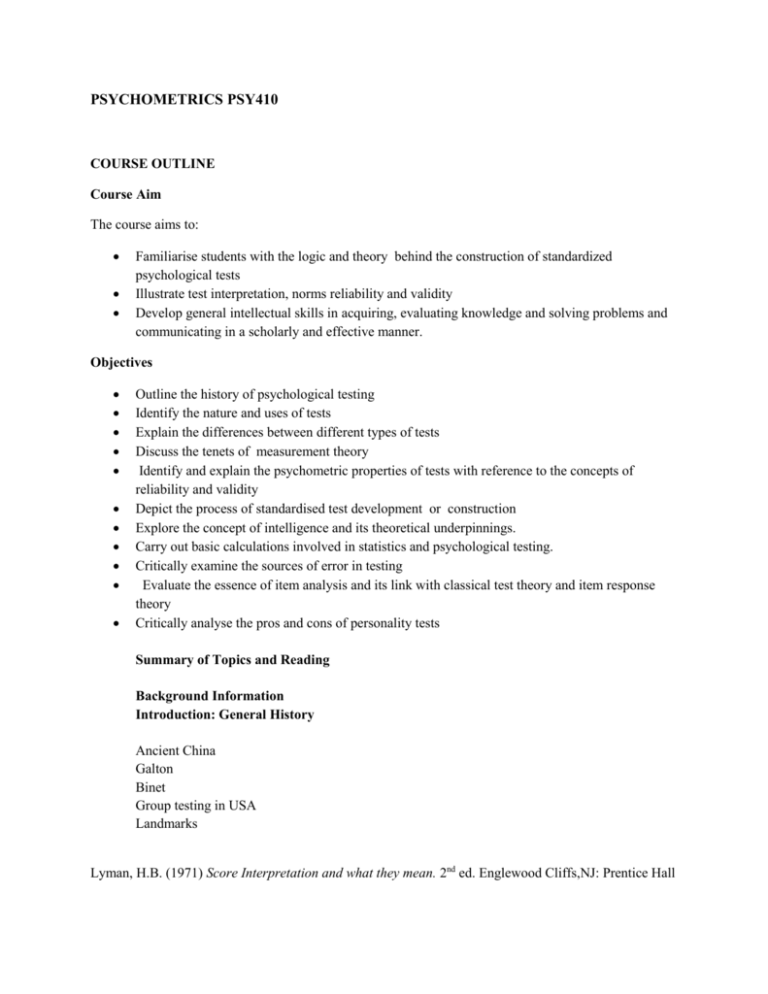
PSYCHOMETRICS PSY410 COURSE OUTLINE Course Aim The course aims to: Familiarise students with the logic and theory behind the construction of standardized psychological tests Illustrate test interpretation, norms reliability and validity Develop general intellectual skills in acquiring, evaluating knowledge and solving problems and communicating in a scholarly and effective manner. Objectives Outline the history of psychological testing Identify the nature and uses of tests Explain the differences between different types of tests Discuss the tenets of measurement theory Identify and explain the psychometric properties of tests with reference to the concepts of reliability and validity Depict the process of standardised test development or construction Explore the concept of intelligence and its theoretical underpinnings. Carry out basic calculations involved in statistics and psychological testing. Critically examine the sources of error in testing Evaluate the essence of item analysis and its link with classical test theory and item response theory Critically analyse the pros and cons of personality tests Summary of Topics and Reading Background Information Introduction: General History Ancient China Galton Binet Group testing in USA Landmarks Lyman, H.B. (1971) Score Interpretation and what they mean. 2nd ed. Englewood Cliffs,NJ: Prentice Hall Lyman, H.B. (1986) The Language of Testing. From test scores and what they mean? 4th ed. Engllewood Cliffs, NJ: Prentice Hall Green,B.F. (1981) A prime of testing. American psychologist, 36 1001 - 1011. Dubois,P. H. (1988) A test-dominated society: China 1115 BC – 1905 AD In W.L.Barnette, Jr., Reading in Psychological measures. Rev. Ed. 249-255, Honewood, II: Dorsey Buss, A.R. (1976) Galton And the birth of differential psychology and eugenics: Journal of the history of the behavioural sciences, 12, 47-58 Gelb, S.A. (1986) Henry, H. Goddard and the immigrants, 1910-197: The studies and their social context, Journal of the history of the Behavioural Sciences, 22, 324- 332 Samelson, F. (1977) World war I intelligence testing and the development of psychology. Journal of the history of Behavioural Sciences, 13, 271 282 Nature and Types of Tests Characteristis of tests Types of tests Norms and test Standardisation Carver, R.P. (1977) Dimensions of tests: psychometric and edumetric. American Psychologist, 29, 512518 The process of testing Test Adminstration Effects of Practice and Coaching Bridgeman, B. (1974). Effects of test score feedback on immediately subsequent test performance. Journal of Educational Psychology, 66, 62-66. Lyman, H. B. (1991). What can we say? From Test scores and what they mean, 5th. ed. (pp. 131-140). Englewood Cliffs, NJ: Prentice Hall. Effects of Practice and Coaching Anastasi, A. (1981). Coaching, test sophistication, and developed abilities. American Psychologist, 36, 1086-1093. Kulik, J. A., Kulik, C.-L., & Bangert, R. L. (1984). Effects of practice on aptitude and achievement test scores. American Education Research Journal, 21, 435447. CR13. Kulik, J. A., Bangert-Downs, R. L., & Kulik, C.-L. (1984). Effectiveness of coaching for aptitude tests. Psychological Bulletin, 95, 179-188 THEORY Interpretive Error Norms Norms and test standardization. Collecting norms Variable Error (Reliability) Definitions and theory. Concepts of reliability Estimates, Standards Concepts of reliability Hogan, T. P., Benjamin, A., & Brezinski, K. L. (2000). Reliability methods: A note on the frequency of use of various types. Educational and Psychological Measurement, 60, 523-531. Charter, R. A. (2003). A breakdown of reliability coefficients by test type and reliability method, and the clinical implications of low reliability. The Journal of General Psychology, 130, 290-304. Charter, R. A. (1996). Revisiting the standard error of measurement, estimate, and prediction and their application to test scores. Perceptual and Motor Skills, 82, 1139-1144. Schuerger, J. M., & Witt, A. C. (1989). The temporal stability of individually tested intelligence. Journal of Clinical Psychology, 45, 294-301 (parts). Schuerger, J. M., Tait, E., & Tavernelli, M. (1982). Temporal stability of personality by questionnaire. Journal of Personality and Social Psychology, 43, 176-182 (parts). Schuerger, J. M., Zarrella, K. L., & Hotz, A. S. (1989). Factors that influence temporal stability of personality by questionnaire. Journal of Personality and Social Psychology, 56, 777-783. Measurement Generalizability theory: Levels of measurement (and psychological measurement) Test construction (pp. 119-121). Stevens, S. S. (1946). On the theory of scales of measurement. Science, 103, 677680. Lord, F. M. (1953). On the statistical treatment of football numbers. American Psychologist, 8, 750-751. (Replies also). Gaito, J. (1980). Measurement scales and statistics: Resurgence of an old misconception. Psychological Bulletin, 87, 564-567. Constant Error (Validity) Basic concepts of validity. Criterion (Empirical) Construct Content Critical overview of test properties Hogan, T. P., & Agnello, J. (2004). An empirical study of reporting practices concerning measurement validity. Educational and Psychological Measurement, 64, 802-812. Kane, M. T. (2001). Current conceptions of validity theory. Journal of Educational Measurement, 38, 319-342. Test Construction (Item Analysis) Test construction (pp. 117-121, 123-4 (Likert, Empirical), 125-135 Intelligence Types of Intelligence Theories of intelligence Calculating IQ Personality testing History of Personality Testing Types of Personality tests Strengths and Weaknesses of personality measures Basic Texts Gregory, R. J. (2004). Psychological testing: History, principles, and applications (4th ed.). Boston: Allyn and Bacon. Coolican, H’ (2004) Research Methods and Statistics in Psychology. $th ed.) London: Hodder and STOUGHTON Anastatsi, A. (1990) Psychological Testing (6th ed.) New York: Macmillan Rust,J and Golombock,s.(1989) Modern Psychometrics:The Science of psychological assessment. LondonRouteledge Glunland, N.E. and Linn, R.L.(1990) Measurement and evaluation in Teaching. (6th ed.) New York: Macmillan

